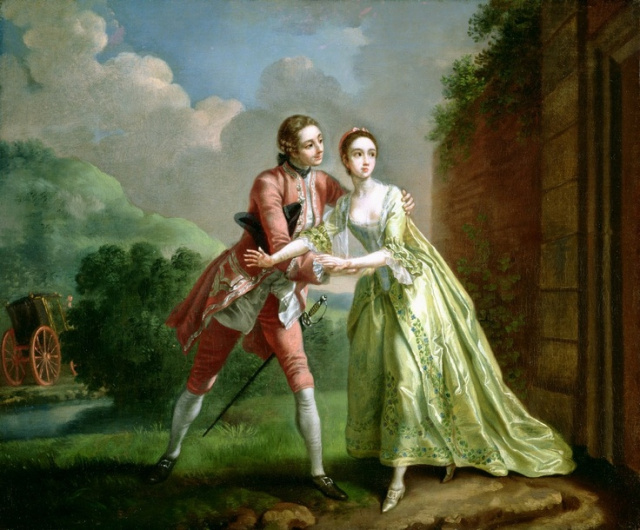Wednesday
As I continue to revise my current book project (Better Living through Literature: A 2500-Year-Old Debate), I am looking into how literature may have come to the aid of Mansfield Park’s Fanny Price at her darkest hour. Fanny is the most well-read of all Austen’s heroines, and while Austen doesn’t specifically mention that her reading assists her when the Bertram family pressures her to marry the problematic Henry Crawford, I’m now convinced that Samuel Richardson’s Clarissa helps steel her resolve.
Although Fanny has been denigrated by any number of readers for being mousy and “insipid” (this from Austen’s own mother), she rises to the occasion when confronted with more pressure than that encountered by any Austen heroine. Unsympathetic readers, who would prefer an Elizabeth Bennet, Emma Woodhouse or Anne Elliot, underestimate her situation. A poor dependent, she is subject to the whims of the Bertram family at all times. She comes into the household as a child and is either ignored, bullied, or exploited by all but her older cousin Edmund.
As she grows older, they continue to thoughtlessly make use of her and to assume that her needs don’t matter. She is deprived of a fire in her room when it’s cold (by the malicious Aunt Norris) and made to run errands in the scorching heat (by the thoughtless Lady Bertram). Even Edmund, without thinking, takes away her horse when a woman he admires (Mary Crawford) wants to ride. All of this Fanny endures without complaint, and it’s noteworthy that the one time she pushes back—when she refuses the Crawford marriage—she is sent back to her impoverished family. Her attempts to remain invisible at all times are a survival tactic.
That’s why her rebellion, when it comes, is so remarkable. Accustomed to downplay her own rights as a human being, she asserts them here. The Bertrams and Crawfords are astounded by her decision. In their eyes, Henry’s proposal is extraordinary considering his wealth and her poverty. It’s the prince proposing to Cinderella.
Only Crawford is no prince. Fanny has seen how, beneath his charming exterior, he is hollow, self-absorbed, manipulative, at times even cruel. He may be everything that society admires, but that’s because society itself has faulty values. If Fanny can see through him whereas others can’t, it’s partly because her position as a dependent makes it necessary to assess those who are above her. But it may also be because she’s acquainted with Richardson’s Robert Lovelace.
Lovelace is the charming rake in Clarissa who first courts her, then kidnaps her, and finally rapes her. Always promising to reform and never doing so, he deludes many. In fact, many 18th century readers wanted Richardson to end the novel with a marriage (even after the rape), just as many readers want Fanny to marry Crawford. I myself did at one point. But Richardson resisted reader pressure and Fanny resists Bertram family pressure, even though Fanny’s beloved Edmund pleads with her and Sir Thomas, hoping that a dose of poverty will bring her “to her senses,” sends her back to her family.
It would be easy for her to decide that her own needs don’t matter, as she has been doing all her life, and succumb. That way she would please everyone, and she’d get an upper class life as a reward. Yet she resists.
Clarissa provides the model for doing so. Clarissa’s family puts unrelenting pressure on her to marry the odious Mr. Soames, sometimes more brutally and with coarser language than that encountered by Fanny. Yet Clarissa remains true to herself and holds firm, just as Clarissa does with Lovelace’s non-stop sexual overtures (which is why he finally resorts to rape). After that, though much of the world condemns Clarissa—they see her as having run off with Lovelace—she knows the truth. In the end, she dies, at which point Richardson practically canonizes her. One can see how having such a literary model would strengthen Fanny.
To be sure, Austen doesn’t actually mention that Fanny has read Clarissa, but it would be strange if she hadn’t, given how much of a reader she is. Richardson was Austen’s favorite author, and Clarissa is arguably the greatest English novel of the 18th century. Women would disappear for days into their private chambers to read the million-word novel, neglecting household duties to do so.
In his article “The Loneliness of the Long Distance Reader,” my dissertation director J. Paul Hunter says that the novel form generally, and Clarissa in particular, ushered in a new kind of solitude, upsetting people who were used to more social interactions. It was like kids disappearing into video games. Husbands were particularly upset at losing their wives’ services, but perhaps they were even more upset at the way the novel promotes female selfhood.
In any event, the thought of Fanny reading Clarissa helps me better understand how she withstands the pressure put on her.


